DevOps is like a set of two words – Development and operations. These domains include the knowledge of the development process, system administration, DevOps toolchains, and infrastructure needs. Ideally, a DevOps engineer makes teamwork easier with a blend of tools, strategies, and values that make collaboration easier for the development and the IT operations team.
But the question is how do you start using DevOps in your software development process? What are the important ideas, and things you need first and what are the key moves?
This guide provides a roadmap for successfully implementing DevOps in software development. By understanding its core principles, prerequisites, strategies, and key practices, organizations can unlock the potential of DevOps to deliver software faster, with higher quality, and in a more collaborative manner.
DevOps Implementation Planning – What Do You Need?
Before diving into DevOps implementation, certain prerequisites need to be in place:
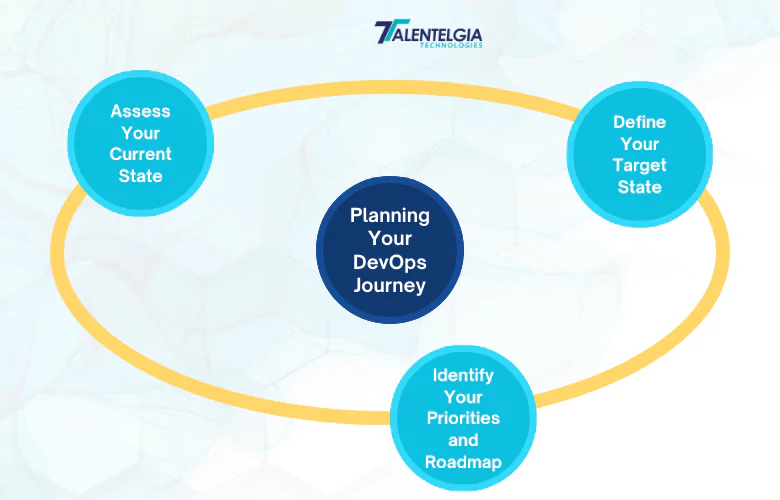
A Goal
Define a clear vision and goal for implementing DevOps in Software Development. The right DevOps development company will align it with business strategy, communicate it to stakeholders, and establish metrics to measure outcomes.
Target State
Specify desired outcomes and benefits using frameworks such as SMART criteria or OKR. Align your target state with business goals and set metrics for measurement.
Roadmap
Prioritize activities using tools like the MoSCoW method or Agile Roadmap. Assign roles and responsibilities with frameworks like the RACI matrix. Determine the scope, timeline, and resources for your DevOps journey.
Supportive Leadership and Culture
Foster a culture that supports collaboration, transparency, and empowerment. Encourage a mindset that embraces change, experimentation, and learning.
Skilled and Motivated Team
Build a skilled and motivated team equipped with technical and soft skills. Provide training, coaching, and mentoring to empower them to make decisions and take ownership.
Suitable Infrastructure and Environment
Ensure a suitable infrastructure, leveraging cloud computing, virtualization, containerization, and microservices. Establish a secure, stable network and a robust system architecture.
Awareness of your Current State
Evaluate your current software development and delivery state using assessment tools like the DevOps Maturity Model. Identify gaps, challenges, and improvement opportunities.
DevOps Implementation Process – 6 Steps Guide to Follow
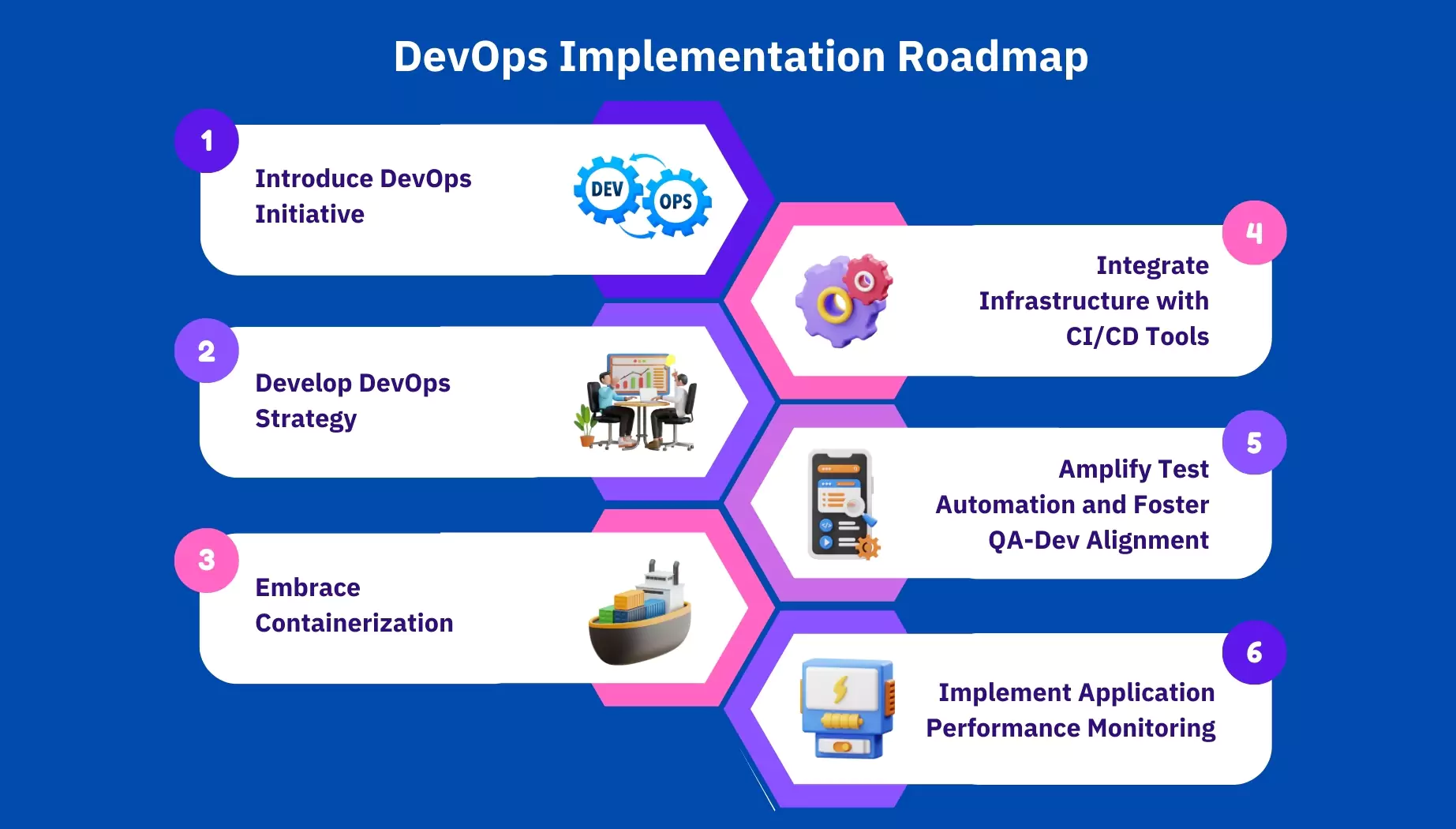
Starting a successful DevOps journey requires a well-crafted and effective implementation roadmap. Our unique DevOps implementation strategy encompasses 6 pivotal steps:
Introduce DevOps Initiative
The pivotal role of the Company’s CIO comes into play during the initiation phase. Introducing a DevOps initiative becomes integral to the organization’s IT endeavors, with a focus on essential aspects such as investment and human resources.
The program manager takes charge of designing a comprehensive DevOps strategy, overseeing its implementation, and orchestrating changes in development and operations activities.
Develop DevOps Strategy
Crafting an effective DevOps strategy hinges on adopting best practices that foster team collaboration and usher in innovative approaches to infrastructure provisioning, software development, and testing.
Our adept program managers set a unified goal, align teams within a collaborative environment, and implement Infrastructure-as-Code (IaC) mechanisms. Automation takes center stage, covering testing, integration, deployment, and release processes.
Embrace Containerization
To ensure software reliability throughout diverse processes, we advocate the adoption of containerization. This approach allows individual software components to operate independently of the overarching infrastructure, enhancing their ability to function in any environment without dependencies.
Additionally, our container packaging facilitates swift application management, especially when modifications are required for a specific microservice.
Integrate Infrastructure with CI/CD Tools
Seamless integration of infrastructure automation tools like Kubernetes, Ansible, and Chef with CI/CD tools such as Jenkins, Bamboo, or GoCD addresses configuration management concerns and streamlines the deployment process.
These tools play a pivotal role in preparing containers for risk tolerance through continuous monitoring and facilitating rolling software updates.
Amplify Test Automation and Foster QA-Dev Alignment
Accelerating delivery cycles is achieved through a robust emphasis on test automation. While functional testing may retain a manual component, we advocate for comprehensive test automation to expedite delivery cycles.
Simultaneously, aligning Quality Assurance (QA) and Development (Dev) teams becomes indispensable to proactively identify and address post-release issues, ensuring a smoother transition to the next build.
Implement Application Performance Monitoring
Detecting, prioritizing, and isolating application defects and their root causes are made seamless through the implementation of application performance monitoring. This involves utilizing specialized software during application server and User Experience (UX) monitoring activities, unveiling potential issues before they impact overall performance.
Key DevOps Practices to Consider
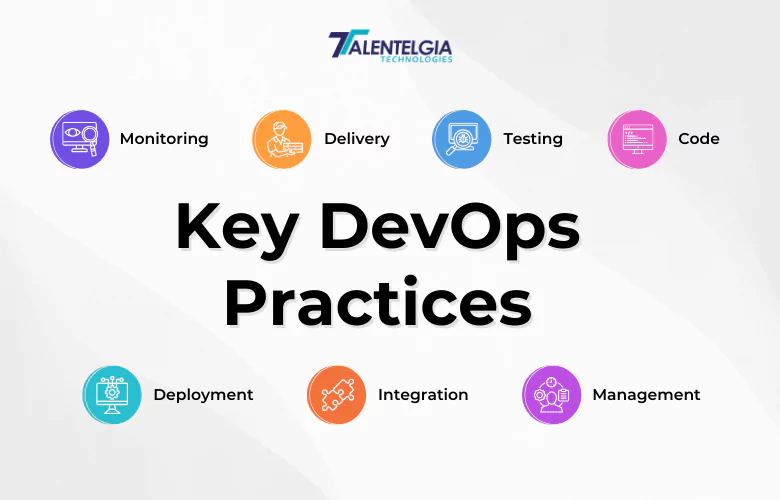
Implement DevOps by embracing these key practices:
Integration
Integrate code changes regularly, verifying them with automated tests. Ensures a working codebase and early detection of bugs.
Delivery
Deliver software in small, frequent releases, maintaining a deployable state. Shortens the feedback loop between developers and customers.
Deployment
Automatically deploy software to production after passing automated tests. Ensures a live state and faster, reliable delivery.
Testing
Test software throughout the delivery process using various automated tests. Minimizes risks and defects, meeting customer requirements.
Monitoring
Monitor software and the delivery process using tools like logs and dashboards. Ensures availability, reliability, and quick issue resolution.
Configuration Management
Manage and control software configuration using version control and release management. Ensures consistency, traceability, and reproducibility.
Infrastructure as Code
Define and provision infrastructure using code and configuration files. Enhances scalability, flexibility, and reliability.
What DevOps Implementation Strategies You Can Choose?
Choose from different implementation strategies based on your context, needs, and goals:
The Big Bang Strategy: Implement DevOps in Software Development across the entire organization and all projects simultaneously. Requires high commitment and coordination but can lead to significant benefits.
The Pilot Strategy: Useful for a small-scale, low-risk projects that scale gradually. Allows testing and validation before expanding to the entire organization.
The Hybrid Strategy: Supports a combination of projects based on readiness and priority. Enables customization and optimization but requires managing complexity.
FAQs
How does DevOps help us get better?
DevOps makes us always try to do better by testing things out, learning from mistakes, and using the best methods to make our work and products better.
What good stuff comes from using DevOps?
DevOps brings lots of good things like getting products out to customers faster, making the products better, saving time with automation, getting teams to work together more, and always learning and coming up with new ideas.
Can any kind of company use DevOps?
Yes, DevOps works for all sorts of companies, big or small. The way to use it might change depending on the company’s needs and goals.
How does DevOps deal with keeping things safe in making software?
DevOps includes a thing called DevSecOps, where we make sure to keep things safe all through making software. We think about safety right from the start of creating something to when it gets used.
In Summary
To sum it up, making DevOps a part of how we develop software isn't just about tech stuff. It's about changing how we work together by using machines to help us, and always trying to get better. If we stick to the main ideas, handle the basics first, and plan things out, we can do DevOps the right way. DevOps development services helps groups make and deliver software faster, making it trustworthy too. Whether we go all in at once or step by step, the trick is to match DevOps with what our group wants and make a culture that likes trying new things and getting better. As we go on our DevOps journey, keeping an eye on how things are going, learning from what people say, and staying open to new ways of doing things is super important. This is how we not only solve today's issues but also stay on top of things in the always-changing world of development. So, start your DevOps adventure today and see how it can make your software development smoother.


 Healthcare App Development Services
Healthcare App Development Services
 Real Estate Web Development Services
Real Estate Web Development Services
 E-Commerce App Development Services
E-Commerce App Development Services E-Commerce Web Development Services
E-Commerce Web Development Services Blockchain E-commerce Development Company
Blockchain E-commerce Development Company
 Fintech App Development Services
Fintech App Development Services Fintech Web Development
Fintech Web Development Blockchain Fintech Development Company
Blockchain Fintech Development Company
 E-Learning App Development Services
E-Learning App Development Services
 Restaurant App Development Company
Restaurant App Development Company
 Mobile Game Development Company
Mobile Game Development Company
 Travel App Development Company
Travel App Development Company
 Automotive Web Design
Automotive Web Design
 AI Traffic Management System
AI Traffic Management System
 AI Inventory Management Software
AI Inventory Management Software
 AI Software Development
AI Software Development  AI Development Company
AI Development Company  AI App Development Services
AI App Development Services  ChatGPT integration services
ChatGPT integration services  AI Integration Services
AI Integration Services  Generative AI Development Services
Generative AI Development Services  Natural Language Processing Company
Natural Language Processing Company Machine Learning Development
Machine Learning Development  Machine learning consulting services
Machine learning consulting services  Blockchain Development
Blockchain Development  Blockchain Software Development
Blockchain Software Development  Smart Contract Development Company
Smart Contract Development Company  NFT Marketplace Development Services
NFT Marketplace Development Services  Asset Tokenization Company
Asset Tokenization Company DeFi Wallet Development Company
DeFi Wallet Development Company Mobile App Development
Mobile App Development  IOS App Development
IOS App Development  Android App Development
Android App Development  Cross-Platform App Development
Cross-Platform App Development  Augmented Reality (AR) App Development
Augmented Reality (AR) App Development  Virtual Reality (VR) App Development
Virtual Reality (VR) App Development  Web App Development
Web App Development  SaaS App Development
SaaS App Development Flutter
Flutter  React Native
React Native  Swift (IOS)
Swift (IOS)  Kotlin (Android)
Kotlin (Android)  Mean Stack Development
Mean Stack Development  AngularJS Development
AngularJS Development  MongoDB Development
MongoDB Development  Nodejs Development
Nodejs Development  Database Development
Database Development Ruby on Rails Development
Ruby on Rails Development Expressjs Development
Expressjs Development  Full Stack Development
Full Stack Development  Web Development Services
Web Development Services  Laravel Development
Laravel Development  LAMP Development
LAMP Development  Custom PHP Development
Custom PHP Development  .Net Development
.Net Development  User Experience Design Services
User Experience Design Services  User Interface Design Services
User Interface Design Services  Automated Testing
Automated Testing  Manual Testing
Manual Testing  Digital Marketing Services
Digital Marketing Services 
 Ride-Sharing And Taxi Services
Ride-Sharing And Taxi Services Food Delivery Services
Food Delivery Services Grocery Delivery Services
Grocery Delivery Services Transportation And Logistics
Transportation And Logistics Car Wash App
Car Wash App Home Services App
Home Services App ERP Development Services
ERP Development Services CMS Development Services
CMS Development Services LMS Development
LMS Development CRM Development
CRM Development DevOps Development Services
DevOps Development Services AI Business Solutions
AI Business Solutions AI Cloud Solutions
AI Cloud Solutions AI Chatbot Development
AI Chatbot Development API Development
API Development Blockchain Product Development
Blockchain Product Development Cryptocurrency Wallet Development
Cryptocurrency Wallet Development About Talentelgia
About Talentelgia  Our Team
Our Team  Our Culture
Our Culture 
 Healthcare App Development Services
Healthcare App Development Services Real Estate Web Development Services
Real Estate Web Development Services E-Commerce App Development Services
E-Commerce App Development Services E-Commerce Web Development Services
E-Commerce Web Development Services Blockchain E-commerce
Development Company
Blockchain E-commerce
Development Company Fintech App Development Services
Fintech App Development Services Finance Web Development
Finance Web Development Blockchain Fintech
Development Company
Blockchain Fintech
Development Company E-Learning App Development Services
E-Learning App Development Services Restaurant App Development Company
Restaurant App Development Company Mobile Game Development Company
Mobile Game Development Company Travel App Development Company
Travel App Development Company Automotive Web Design
Automotive Web Design AI Traffic Management System
AI Traffic Management System AI Inventory Management Software
AI Inventory Management Software AI Software Development
AI Software Development AI Development Company
AI Development Company ChatGPT integration services
ChatGPT integration services AI Integration Services
AI Integration Services Machine Learning Development
Machine Learning Development Machine learning consulting services
Machine learning consulting services Blockchain Development
Blockchain Development Blockchain Software Development
Blockchain Software Development Smart contract development company
Smart contract development company NFT marketplace development services
NFT marketplace development services IOS App Development
IOS App Development Android App Development
Android App Development Cross-Platform App Development
Cross-Platform App Development Augmented Reality (AR) App
Development
Augmented Reality (AR) App
Development Virtual Reality (VR) App Development
Virtual Reality (VR) App Development Web App Development
Web App Development Flutter
Flutter React
Native
React
Native Swift
(IOS)
Swift
(IOS) Kotlin (Android)
Kotlin (Android) MEAN Stack Development
MEAN Stack Development AngularJS Development
AngularJS Development MongoDB Development
MongoDB Development Nodejs Development
Nodejs Development Database development services
Database development services Ruby on Rails Development services
Ruby on Rails Development services Expressjs Development
Expressjs Development Full Stack Development
Full Stack Development Web Development Services
Web Development Services Laravel Development
Laravel Development LAMP
Development
LAMP
Development Custom PHP Development
Custom PHP Development User Experience Design Services
User Experience Design Services User Interface Design Services
User Interface Design Services Automated Testing
Automated Testing Manual
Testing
Manual
Testing About Talentelgia
About Talentelgia Our Team
Our Team Our Culture
Our Culture
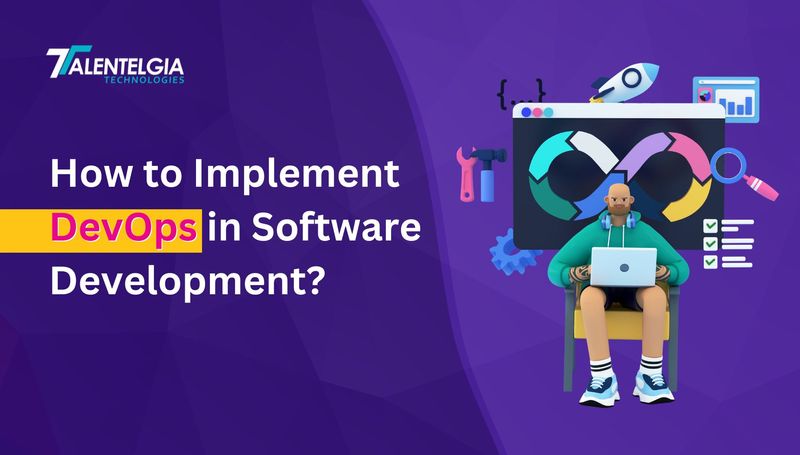



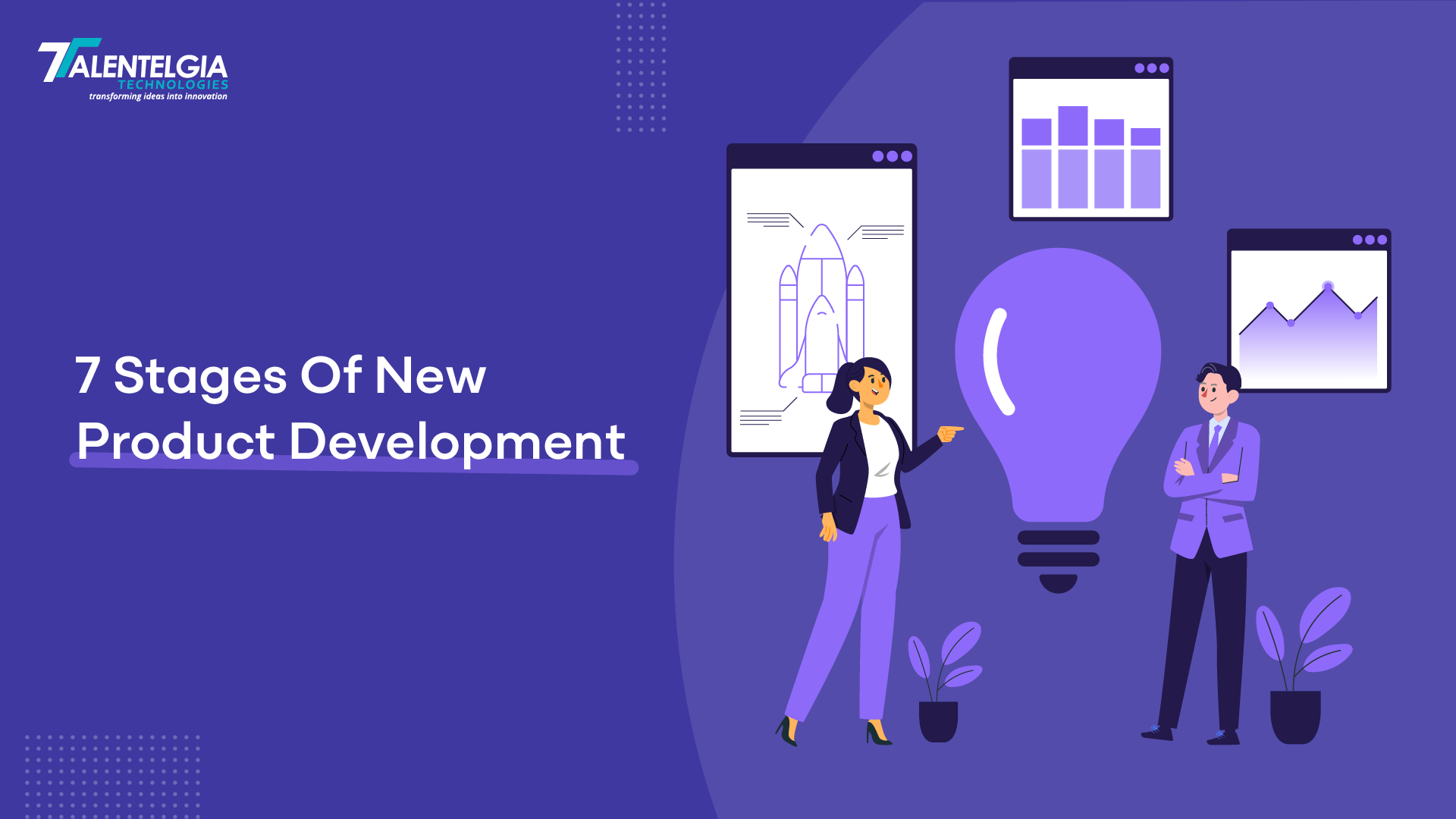
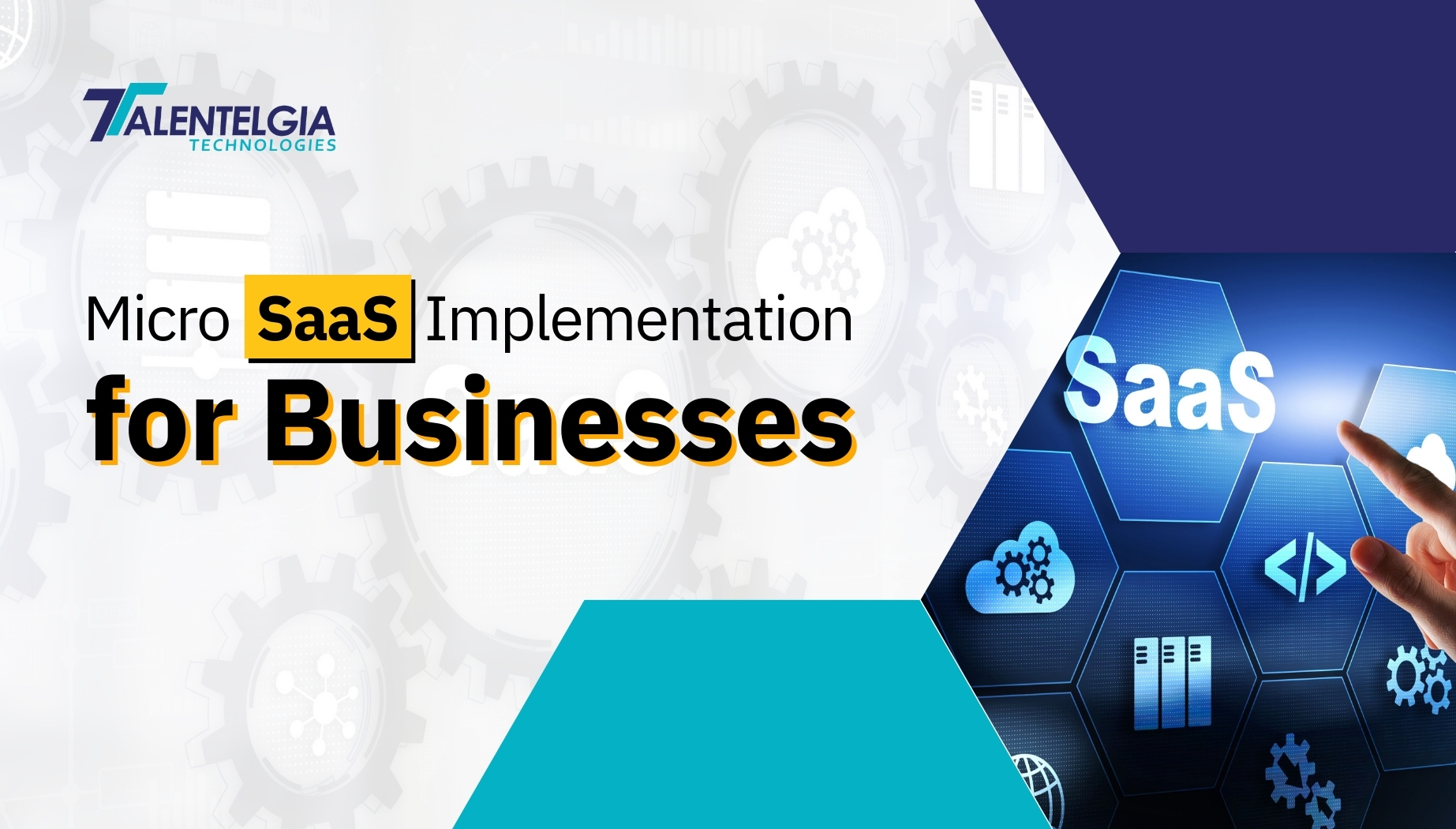











 Write us on:
Write us on:  Business queries:
Business queries:  HR:
HR: 




